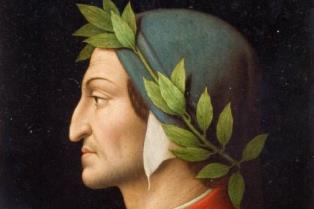
WTI Magazine #49 2014 December, 10
Author : Giuseppina Salzano e Giovanni Verde Translation by:
Dante Alighieri is not only a Great Italian of the past. His name exceeds the boundaries of his and our country and the era in which he lived, to get into a universal dimension of time and space, symbol of the whole Western culture and lighthouse of the literature of all time.
His thought, his vision, his writings have influenced centuries of cultural debate in every corner of the world. His figure, never weakened by time, remains in the collective consciousness - in Italy as in every other place - to represent the complexity of the deeper human soul and the extraordinary ability of a pen that has managed to combine various shades of humanity and art.
Dante, or more simply "the poet", was born in Florence between May and June 1265 in the important Alighieri family, linked to the White Guelphs, political faction that was opposed in the Tuscan capital to Black Guelph. Both political groups are linked to the figure of the Pope although the whites, more moderate, will support with conviction the non-interference of the Pope in the affairs of the city of Florence.
Dante's political activity costs his an event among the most painful of his life, which will have profound influences on his writings: suspected of treason by the White Guelphs, after having choose not to agree with some of the decisions of the political group, the poet is sent into exile first in Lunigiana, then in Romagna, where he dies in Ravenna on September 14, 1321.
Along with Francesco Petrarca, Dante is considered the father of the Italian language. Among the first to publish works in what was then called "the vernacular language" spoken by the people, Dante challenges the poetry of the time, imbued with Late Latin high conceptions, to reconsider a line closer to reality, a style that could well describe the extraordinary range of human feelings that he paints in his verses.
The real and ideal love of Dante for his Beatrice is not only a moment of deep human affection, or just a powerful introspection that anticipates issues of philosophical humanism that will only appear almost two hundred years after. The love of the Florentine poet for his muse is the engine of Dante's contributions at Dolce Stil Novo, the literary style that becomes popular in those years, thanks to the work of Brunetto Latini, Lapo Gianni, Cino da Pistoia. Rises in those years a more involving vision of love, communicated through a different poetic structure. This scheme will endure over time, so much that even today in modern pop music we are able to appreciate some of its characteristics.
Among the works of Dante, one of the most famous is "Vita Nova" (The New Life), composed between 1292 and 1293: a sort of autobiographical novel. Written in prose and verse, it tells the spiritual evolution of Dante's poetry, analyzing the messages of some of his sonnets, such as the famous "Tanto gentile e tanto onesta pare" (so gentle and so honest she seems). The work gained huge popularity in the United States, thanks to the translation of the great writer Ralph Waldo Emerson.
"Convivio" (The banquet) is the first opera written by Dante after his forced removal from Florence. The title of the work, composed between 1304 and 1307. Dante refers to a metaphorical banquet of wisdom, inviting all to feed knowledge and considering blessed those who would took part of it while considering lousy those who would refuse to do that. In the "Convivio", Dante provides a compendium of the knowledge of that time, accessible even to those who had not completed higher studies.
But for the whole world the most important work of this magnificent poet is the "Divina Commedia" (Divine Comedy). "Commedìa" is the original title of the most important work written in Italian history and one of the the best examples of world literature of all time. More than fourteen thousand eleven-syllable verses, distributed in a hundred "canti" (cantos), which are further divided into three "cantiche" (canticas), one for each dimension of the afterlife.
Commedìa is Dante's journey through Hell, Purgatory and Heaven, between sin and mercy, anger and forgiveness. A long journey, during which Dante meets characters of the past and of his own present and reveals their deeper conditions and their most powerful humanity, in a variety of styles, registers, colors, musical nuances that fit in a perfect harmony, at the same time unique and endless.
A timeless fresco, which makes of Dante Alighieri a symbol of Italy's past and a wealth of our elusive modernity.



